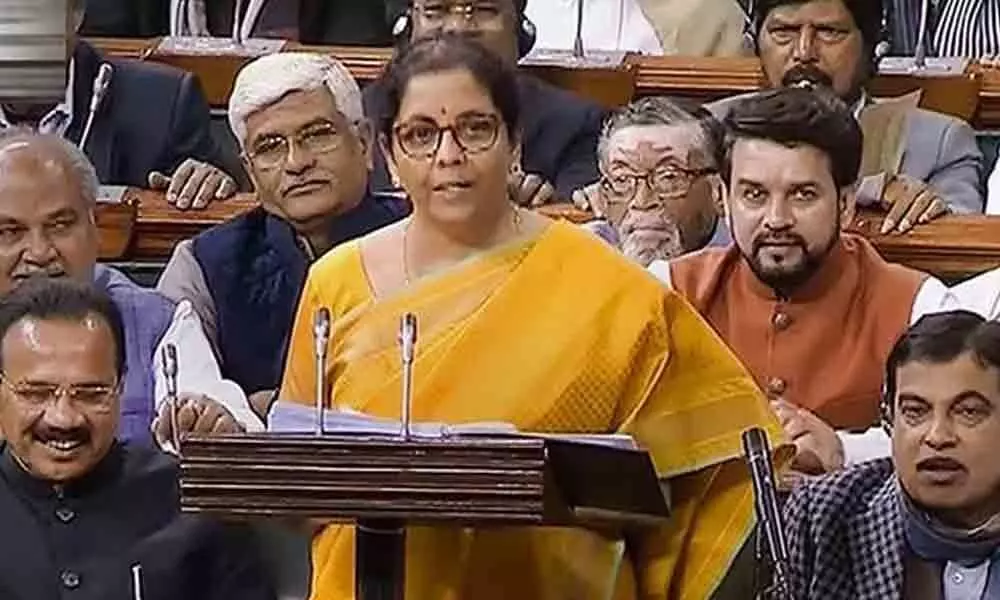Live
- Common Mistakes to Avoid When Hiring Executive Manufacturing Recruiters in Mexico
- Thila Taila Abhishekah Pooja to Lord Shaneswara
- Priyanka Gandhi says BJP talking of 'tinkering' with Constitution with PM’s nod
- LS polls: PM Modi says BJP-NDA leading 2-0 after first two phases
- Plea in Madras HC seeks special polling arrangement for names 'missing' from Coimbatore voter list
- Ex CM KCR Bus tour on 4 th day
- Youth National Games 2024 kick-start in Delhi; over 5,000 athletes from 15 states vying for top honours
- TN Police warn people against fraudsters using AI-based voice cloning
- L-G office blames Saurabh Bharadwaj for delay in enhancing MCD Commissioner's financial powers
- ICICI Bank posts 17 per cent rise in Q4 net profit at Rs 10,707cr; declares dividend of Rs 10 per share
Just In
Capex push to spur economic growth: Finance Minister Nirmala Sitharaman


Pegs GDP growth at 10% in FY21; Capital expenditure hiked by 21% to prop up economy
New Delhi: The government on Saturday pegged the country's nominal GDP growth rate at 10 per cent in the next fiscal and said the capital expenditure is scaled up by 21 per cent to prop up the economy.
Presenting the Budget for 2020-21, Union Finance Minister Nirmala Sitharaman also said that receipts for 2020-21 are pegged at Rs 22.46 lakh crore while expenditure at Rs 30.42 lakh crore.
The revised estimated expenditure for FY20 has been pegged at Rs 26.99 lakh crore and receipts at Rs 19.32 lakh crore, she said.
The net market borrowings would be at Rs 4.99 lakh crore in FY2019-20 and are estimated at Rs 5.36 lakh crore in the next fiscal. "We have estimated nominal growth of GDP for year 2020-21, on the basis of trends available, at 10 per cent," she said.
India's nominal GDP growth rate for 2019-20 is estimated at 7.5 per cent after growing by 11.2 per cent in FY 2018-19, as per the Budget documents. Sitharaman further said a good part of the borrowings for the financial year 2020-21 would go towards capital expenditure of the government that has been scaled up by more than 21 per cent.
"That should spur growth impulses in the economy," the minister said.
She, however, said the government expected tax buoyancy to take time and the recent cut in corporate tax to cause loss of substantial revenue in short run, but the economy will reap huge returns in due course.
Sitharaman said income tax rates will be significantly reduced for those who forego reliefs, exemptions.
To address liquidity constraints of NBFCs and housing finance corporations, partial credit guarantee scheme will be launched by the government, Sitharaman added.
The finance minister said amendments will be made to enable NBFCs to extend invoice financing to MSMEs. Sitharaman said the government has accepted recommendations of interim report of 15th Finance Commission and the final report will be submitted later.
All flagship schemes of the government are provided for in Budget, the finance minister said. According to the Budget document 2020-21, the economic growth slowdown has appeared to have bottomed out and is expected to pick up in 2020-21.
The document further said the prospects for the Indian economy in 2020-21 need to be assessed in the light of emerging global and domestic challenges and opportunities.
Sitharaman said people of India have unequivocally given jan-aadesh (mandate) for not just political stability but also reposed faith in the government's economic policies.
"During 2014-19, we clocked growth of 7.4 per cent on average with inflation, averaging around 4.5 per cent," Sitharaman said adding that India was able to raise 271 million people out of poverty between 2006 and 2016.
According to the Budget document, global headwinds and challenges in the domestic financial sector moderated the growth of the Indian economy in 2019-20. As per the first Advance Estimates released by the National Statistical Office (NSO), the country's economic growth is likely to hit an 11-year low of 5 per cent in the current financial year ending March 2020.
The Economic Survey on Friday projected a revival of economic growth to 6-6.5 per cent in the next financial year starting April 1. "Despite a temporary moderation in the gross domestic product (GDP) growth in 2019-20, the fundamentals of Indian economy remain strong and GDP growth is expected to rebound from the first quarter of 2020-21," it said.
The document noted that major challenges for the economy arising from the external front are geo-political tensions in the Middle East and rising crude oil prices due to supply disruption that may decelerate growth and increase inflation.
"Challenges in the domestic front are revival of investments and savings," it said. According to the document, fiscal situation remained close to the consolidation path and Consumer Price Index-based inflation was within the targeted limits set by the Monetary Policy Committee of the Reserve Bank of India (RBI).
Despite continuing sluggishness in global demand, the current account deficit narrowed to 1.5 per cent of GDP in the first half of 2019-20 from 2.1 per cent in 2018-19, it said.

© 2024 Hyderabad Media House Limited/The Hans India. All rights reserved. Powered by hocalwire.com






